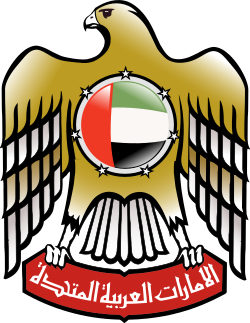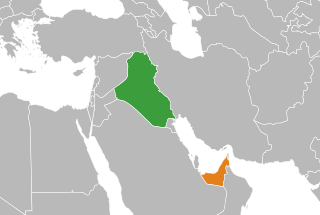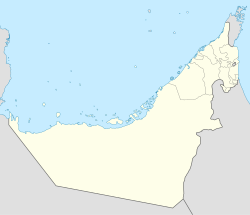
Politics of the United Arab Emirates take place in a framework of a federal, elective, and constitutional monarchy. The United Arab Emirates (UAE) is a federation of seven constituent monarchies: the Emirates of Abu Dhabi, Ajman, Dubai, Fujairah, Ras al-Khaimah, Sharjah, and Umm al-Quwain. According to convention, the ruler of Abu Dhabi is the President of the United Arab Emirates and the head of state, and the ruler of Dubai is the Prime Minister of the United Arab Emirates, the head of the government.

The United Arab Emirates Armed Forces are the armed forces of the United Arab Emirates and have primary responsibility for the defence of all seven emirates. They consists of approximately 100,000 personnel, and are headquartered in Abu Dhabi, United Arab Emirates.

Since the establishment of the United Arab Emirates on 2 December 1971, the UAE adopted a balanced foreign policy based on adoption of dialogue, respect of international conventions, commitment to the United Nations Charter and non-interference of other country's internal affairs, and the settlement of disputes by peaceful means. One of the main anchorers of the UAE’s foreign policy has been building cooperation-based relations with all countries of the world. Substantial development assistance has increased the UAE's stature among recipient states. Most of this foreign aid has been to Arab and Muslim countries.

The United Arab Emirates, sometimes simply called the Emirates, is a sovereign state in Western Asia at the northeast end of the Arabian Peninsula, in the south of the Persian Gulf, bordering Oman to the east, and Saudi Arabia to the south and west, as well as sharing maritime borders with Qatar to the west and Iran to the north. The sovereign absolute monarchy is a federation of seven emirates consisting of Abu Dhabi, Ajman, Dubai, Fujairah, Ras Al Khaimah, Sharjah and Umm Al Quwain. Their boundaries are complex, with numerous enclaves within the various emirates. Each emirate is governed by a ruler; together, they jointly form the Federal Supreme Council. One of the rulers serves as the President of the United Arab Emirates. In 2013, the UAE's population was 9.2 million, of which 1.4 million were Emirati citizens and 7.8 million were expatriates. The estimated population of the UAE in 2020 was 9.89 million.

Ras Al Khaimah (RAK), also spelled as Ras al Khaimah or Ras al-Khaimah, is one of the seven emirates that make up the United Arab Emirates (UAE). The city of Ras Al Khaimah, sometimes simply abbreviated to RAK or RAK City, is the capital of the emirate and home to most of the emirate's residents. It is linked to the medieval trading port of Julfar.

The flag of the United Arab Emirates contains the Pan-Arab colors red, green, white, and black. It was designed in 1971 by Abdullah Mohammed Al Maainah, who was 19 years old at that time, and was adopted on 2 December 1971. The main theme of the flag's four colors is the unity of Arab nations. In 2008, there was a minor change to the Emblem.

Khalifa bin Zayed bin Sultan Al Nahyan is the current President of the United Arab Emirates, the Emir of Abu Dhabi, the Supreme Commander of the United Arab Emirates Armed Forces and the chairman of the Supreme Petroleum Council. Sheikh Khalifa is also chairman of Abu Dhabi Investment Authority, which manages $875 billion in assets, the largest amount managed by a nation's head of state in the world. Collectively, the Al Nahyan family is believed to hold a fortune of $150 billion.

E 11 is a highway in the United Arab Emirates (UAE). The longest road in the Emirates, it stretches from Al-Silah in the Emirate of Abu Dhabi and ends in Ras al-Khaimah emirate, running roughly parallel to UAE's coastline along the Persian Gulf. The road forms the main artery in some emirates' main cities, where it assumes various alternate names —Sheikh Maktoum Bin Rashid Road and Sheikh Khalifa bin Zayed Road in Abu Dhabi, Sheikh Zayed Road in Dubai, and Sheikh Muhammad bin Salem Road in Ras al-Khaimah.

The emblem of the United Arab Emirates was officially adopted in 1973 and later modified in 2008. It is similar to the coats of arms and emblems of other Arab states.

The President of the United Arab Emirates, or the Raʾīs, is the head of state of the United Arab Emirates (UAE). The President and Vice-President are elected every five years by the Federal Supreme Council. Though the UAE Prime Minister is formally appointed by the President, every UAE Vice-President simultaneously serves as Prime Minister. Usually, a sheikh from the Emirate of Abu Dhabi holds the presidency, and a sheikh from the Emirate of Dubai the vice-presidency and premiership.

Sharjah is the third largest and third most populous city in the United Arab Emirates, forming part of the Dubai-Sharjah-Ajman metropolitan area. The emirate of Sharjah borders with Dubai to the south, Ajman and Umm Al Quwain to the north and Ras Al Khaimah to the east. It is the only emirate that overlooks the coastline on the Persian Gulf to the west and the Gulf of Oman to the East, with the eastern Sharjah coastal towns of Kalba and Khor Fakkan.

United Arab Emirates–United States relations are bilateral relations between the United Arab Emirates and the United States of America. The United Arab Emirates has been described as the United State's best counter-terrorism ally in the Gulf by Richard A. Clarke, the US national security advisor and counter-terrorism expert. In terms of defense, the United Arab Emirates Armed Forces has been nicknamed "Little Sparta" by United States Armed Forces Generals and US secretary of defense James Mattis for its active role against extremists in the Middle East. The United Arab Emirates also hosts the only United States border preclearance in the Middle East.

Iraqi-Emirati relations are foreign relations between the Republic of Iraq and the United Arab Emirates. Iraq has an embassy in Abu Dhabi and a consulates general in Dubai, while the United Arab Emirates has an embassy in Baghdad.
Sport in the United Arab Emirates is widely practiced by the people of the UAE. Football is the most popular sport in the UAE. Among the notable UAE sports achievements is the 2002–03 AFC Champions League won by Al Ain FC who also finished second in the 2005 AFC Champions League. The UAE qualified for the FIFA World Cup for the first and only time so far in 1990, the fourth Middle-Eastern country to have qualified for the World Cup after first Egypt, then, Kuwait, and Iraq.

There are many tourist attractions in Dubai, resulting from the large scale construction boom. Mohammed bin Rashid Al Maktoum, the current Ruler of Dubai and the prime minister of the United Arab Emirates, wants Dubai to become the top tourist destination in the world. Dubai received 14 million tourists from all around the world in 2015. Euromonitor ranked the world's 150 most visited cities by international tourists in 2009; Dubai ranked 7th. Dubai hosted a record 10 million visitors in 2012, an increase of 9.3% from the previous year. Dubai's economy relies on many sections of the "state", one of the most important being tourism, in 2014 total 70,475,636 passengers traveled through Dubai Airport. To maintain this important position in the tourism industry they have been known to create big and impressive tourist attractions.

Militarily, the United Arab Emirates (UAE) and France negotiated a defence cooperation agreement to diversify the UAE's procurement of weaponry, in addition to a significant military relationship with the United States; France is one of the country’s primary providers of military matériel.

Australia – United Arab Emirates relations refer to the bilateral ties between Australia and the United Arab Emirates. The UAE maintains an embassy in Canberra whilst Australia has an embassy in Abu Dhabi and a consulate-general in Dubai.
Most expatriates in the United Arab Emirates reside in Dubai and Abu Dhabi. A number of expatriates settled in the country prior to independence. The UAE is home to over 200 nationalities. Emiratis constitute roughly 20% of the total population, making UAE home to one of the world's highest percentage of immigrants. Indians and Pakistanis form the largest expatriate groups in the country, constituting 28% and 12% of the total population respectively. 461,000 Westerners live in the United Arab Emirates, making up 5.1% of its total population.
Yousif Mohamed Ahmed Mirza Al-Hammadi is an Emirati racing cyclist, who currently rides for UCI WorldTeam UAE Team Emirates.














